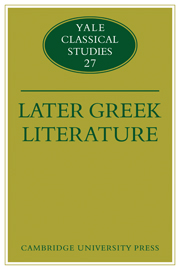Book contents
- Frontmatter
- Contents
- Introduction
- Theme, structure and narrative in Chariton
- The importance of sophists
- Lucian: a sophist's sophist
- The mendacity of Kalasiris and the narrative strategy of Heliodoros' Aithiopika
- The Emperor Julian on his predecessors
- Greek translations of Latin literature in the fourth century A.D.
- The empress and the poet: paganism and politics at the court of Theodosius II
- Pastiche, pleasantry, prudish eroticism: the letters of ‘Aristaenetus’
- The date and purpose of the Philopatris
The empress and the poet: paganism and politics at the court of Theodosius II
Published online by Cambridge University Press: 06 December 2010
- Frontmatter
- Contents
- Introduction
- Theme, structure and narrative in Chariton
- The importance of sophists
- Lucian: a sophist's sophist
- The mendacity of Kalasiris and the narrative strategy of Heliodoros' Aithiopika
- The Emperor Julian on his predecessors
- Greek translations of Latin literature in the fourth century A.D.
- The empress and the poet: paganism and politics at the court of Theodosius II
- Pastiche, pleasantry, prudish eroticism: the letters of ‘Aristaenetus’
- The date and purpose of the Philopatris
Summary
The names of the poet Cyrus and the Empress Eudocia have always tended to be linked. They were indeed the two most celebrated poets of the court of Theodosius II – and its two most conspicuous political casualties. In the past their fall has generally been seen as the collapse of a movement to liberalize the increasingly intolerant Christian culture of the age. This paper offers an alternative interpretation, beginning with the career and personality of Cyrus.
Panopolis
Like so many Greek poets of the fourth and fifth centuries of our era, Fl. Taurus Seleucus Cyrus Hierax (to give him his recently discovered full name) was not born at one of the traditional cultural centres of the Graeco-Roman world, but in Upper Egypt. His home town was Panopolis. Cyrus was indeed by no means the first or last poet to be produced in such a seemingly unpromising spot. The most famous of his fellow townsmen, and an approximate contemporary of Cyrus, was the remarkable Nonnus, perhaps the most influential Greek poet since Callimachus. The wily Pamprepius, philosopher, magician and adventurer as well as poet, was born there on 29 September 440, just three months before Cyrus entered upon his consulship. About a century earlier the poet and grammarian Horapollon was born at Phenebith, a village in the nome of Panopolis.
- Type
- Chapter
- Information
- Later Greek Literature , pp. 217 - 290Publisher: Cambridge University PressPrint publication year: 1982
- 24
- Cited by



